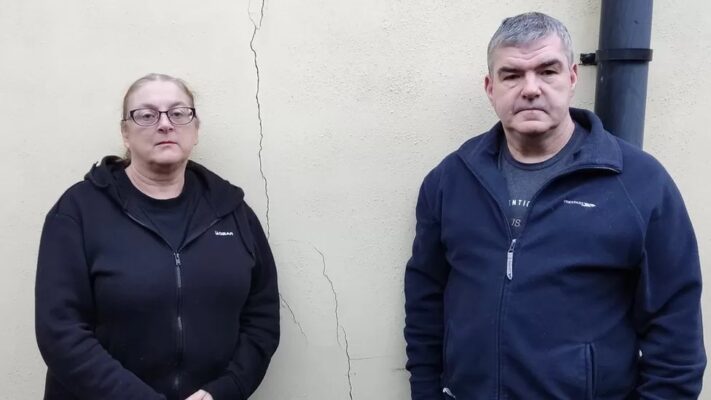
Kate and Danny Rafferty’s Derry home affected by mica scandal
Mica and pyrite are minerals that absorb water and cause buildings to disintegrate and plastering to crack.
Up to 5,700 houses have been affected in the Republic.
“People are just blind to the fact it has come over the border,” homeowner Kate Rafferty told BBC Radio Foyle.
“It’s going to cost us a lot of money and, on top of that, if we have to move loads of stuff out of the house in order for the walls to come down, where do we put it?
“I do worry because I’m not really sure where we’re going to go or what we’re going to do.”
Danny and Kate Rafferty live on Beragh Hill Road in Derry.
They first noticed cracks forming on some of their walls a few years ago.
“It’s all bubbling and when you press your finger on the bubbles it all cracks the plaster,” said Mr Rafferty.
“When you rub it between your hands it breaks into nothing.”
The couple’s story was first reported by the Sunday Independent newspaper.
The Raffertys’ house was built between 2005 and 2006.
“About five or six years went by and we noticed a few cracks and people told me it was settlement cracks,” Mr Rafferty said.
“We got a painter out and he filled in all the cracks and then they put stuff on and painted it but a few years later the paint started coming off again.”
After paying for an engineering survey, the bricks tested positive for mica.
In 2016, an expert panel was set up in the Republic of Ireland to investigate problems with homes affected by mica and another mineral, pyrite.
Thousands of homeowners – primarily in counties Donegal and Mayo – have been affected.
In 2019, the Irish government approved a €20m (£17.2m) repair scheme.
But many homeowners said that the scheme was not fit for purpose.
Last year, a compensation scheme for homeowners affected by crumbling blocks was announced by ministers after years of campaigning and, in September, a 10% levy on concrete blocks was announced as part of the Irish government’s budget.
Mr Rafferty said he wants a functioning government in the North so victims can be compensated.
Tags:




